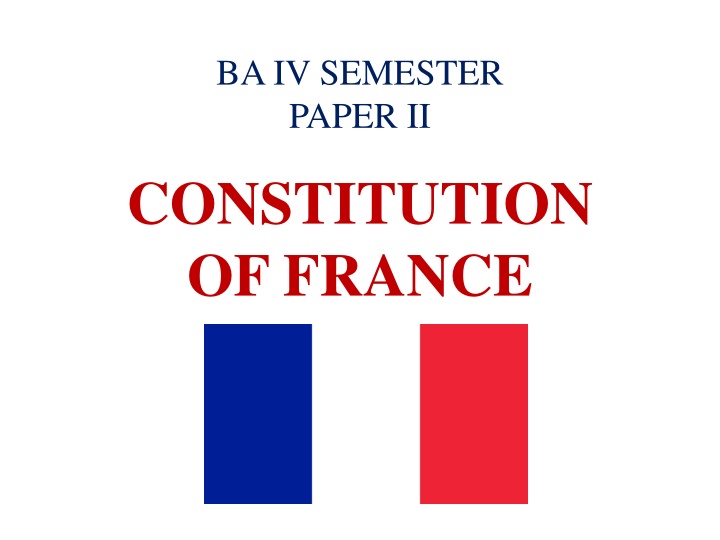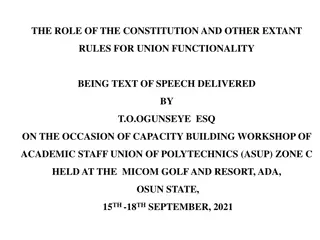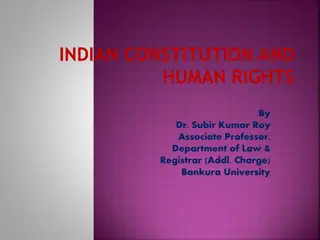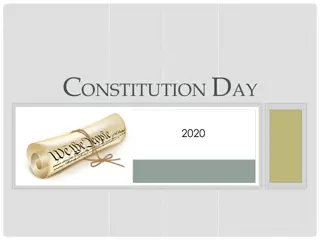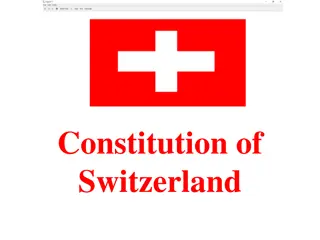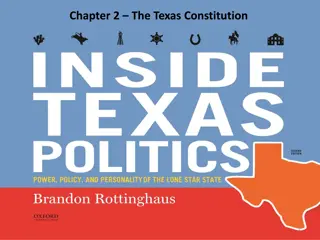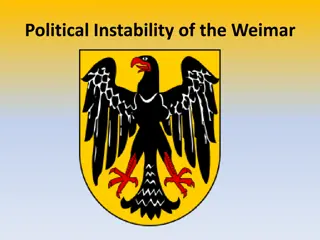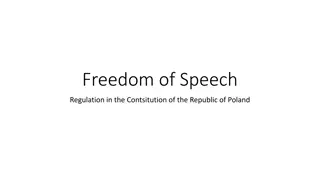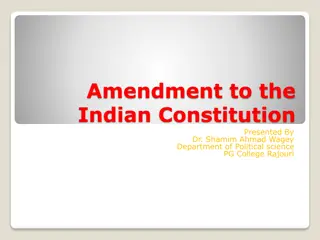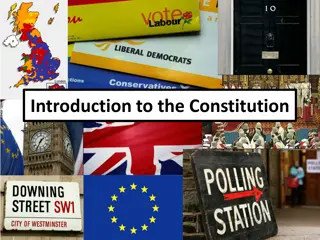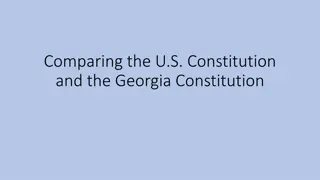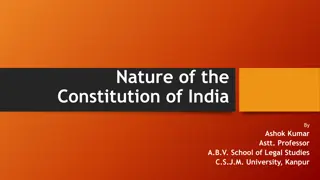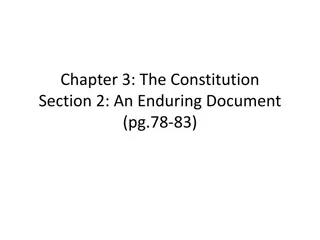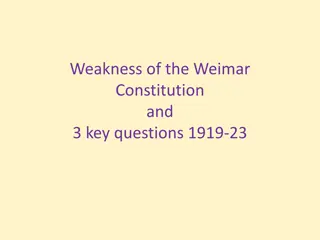Constitution of France: Salient Features of the Fifth Republic
The Constitution of France, in operation since 1958, aimed to bring stability after years of constitutional changes. It is rigid with complex amendment processes. France has a unitary constitution, a bicameral legislature, and a mix of presidential and parliamentary systems. The 5th Republic Constitution emphasizes central government powers, with a unique amendment process through referendums. The Economic, Social, and Environmental Council advises the government and parliament.
Download Presentation

Please find below an Image/Link to download the presentation.
The content on the website is provided AS IS for your information and personal use only. It may not be sold, licensed, or shared on other websites without obtaining consent from the author.If you encounter any issues during the download, it is possible that the publisher has removed the file from their server.
You are allowed to download the files provided on this website for personal or commercial use, subject to the condition that they are used lawfully. All files are the property of their respective owners.
The content on the website is provided AS IS for your information and personal use only. It may not be sold, licensed, or shared on other websites without obtaining consent from the author.
E N D
Presentation Transcript
BA IV SEMESTER PAPER II CONSTITUTION OF FRANCE
INTRODUCTION Since the French revolution in 1789, France has witnessed thirteen constitutions. The current constitution has been in operation since October 4, 1958, which is also termed as the constitution of fifth republic. The Constituent Assembly under the inspiration of General Charles De Gaulle, who was also the first President of the fifth republic, had framed the constitution. One of the prime motive of the constitution was to eradicate any chance of constitutional instability which used to be the drawback of previous constitutions, therefore one can say that the constitution of fifth republic has been successful in achieving constitutional stability in France.
SALIENT FEATURES OF THE CONSTITUTION French constitution is a written, brief and enacted. Initially it had contained 92 Articles but after Algeria got independence from France in 1962, articles related to French community were dropped bring down the total number of Articles to 89 which are divided into 17 Chapters and a Preamble. Constitution is rigid in nature as the amendment process is complex. Article 89 prescribes two ways of amending the constitution i.e. Firstly, The initiative for constitution shall belong to the President of the Republic on the proposal of the Prime Minister and to the members of the Parliament. The Government or the parliamentary bill for amendment must be passed by the two assemblies in identical terms. amending the
The amendment shall become definite after approval by a referendum. Secondly, If a Government bill is proposed by the President in the joint bill sitting of the two houses and if it is passed by a 3/5 majority, then the proposed bill becomes an amendment even without been approved by the people in a referendum. France has unitary constitution that means all powers of administration have been vested in the central government. Local governments derive their powers from the central government and not from the constitution.
France has a Bi-cameral legislature. Article 24 declare, Parliament is composed of the National Assembly and the Senate . National Assembly is the lower, powerful and a directly elected house while Senate is the upper, less powerful and indirectly elected house.. France has a mixture of presidential and parliamentary systems of government. The President is the head of the State and the Prime Minister is the head of the government.
The constitution of the fifth republic has created council (The Economic and Social Council) but now after an amendment in 2008 it is called the Economic, Social and Environmental Council. This Council gives advice to the government and parliament on matters related to social and economic importance. a new
FRENCH EXECUTIVE The President The office of President has acquired a most significant position under the constitution of fifth republic as compared to the constitutions of third and fourth republics. Chapter 2, Articles 5 to 19 of the French constitution deals with the President. The President is directly elected by the French people for the term of five years via run-off voting which ensures elected person always obtains majority.
Powers and Functions of the President The President has a power to choose the Prime Minister but cannot dismiss him or her. He can appoints as well as dismiss the members of the cabinet on the advice of the prime minister and make most appointments with the consent of the cabinet. The President may dissolve the lower house of the French parliament i.e. the NationalAssembly. The President is the commander-in-chief of the armed forces. The President presides over the meeting of the Council of Ministers. The President Promulgates laws passed by the parliament. The President has a right to grant pardon.
The Prime Minister The Constitution of the fifth republic requires for the parliamentary form of government with strong presidency. The President appoints the Prime Minister, who need not be a member of the parliament. The President may appoints any person to the office without consulting any party or person. The prime minister remain in office as long he enjoys the confidence of the National Assembly. In other words he cannot be dismissed by the President.
Powers and Position of the Prime Minister and the Cabinet The Prime minister is the head of the government and conducts the day to day affairs of the country. Position of the Prime Minister in the fifth republic is not assertive and authoritative as used to be in the fourth republic. The Prime Minister and the other members of the cabinet are not the members of the parliament but are responsible towards the parliament. He selects the members of the cabinet who are appointed by the President. The Prime Minister can be ousted by the National Assembly if latter passes the no confidence motion against the former.
The ministers can be dismissed by the president on the advice of the Prime Minister. Despite not being the member of any of the houses of the parliament, ministers participate in the sessions of the parliament as well as members of parliament also ask questions to the ministers.
French Legislature The French parliament under the fifth republic is the bicameral which consists of two houses the National Assembly and the Senate. The National Assembly is a lower, popularly elected, more powerful house while the Senate is a upper, indirectly elected and the less powerful house. The Parliament is a law making body which meets for single nine month long session each year. Both the houses enjoy nearly same powers.
The National Assembly The National Assembly consists of 577 members called the Deputies which are elected directly by the people on the basis of Two Round Voting System. The term of the National Assembly is five years but can be dissolved by the President before the completion of the term. The National Assembly can overthrow the government by a motion of no confidence. Eligibility age for contesting election of the National Assembly is 18 years.
The Senate 348 members The approximately 150000 officials including regional councilors, department councilors, mayors, municipal councilors in large communes, as well as the members of the NationalAssembly. Each senator enjoys six year term. The President of the Senate is elected from among the senators and in case of death or removal of the President of France, the President of Senate will become an acting President until a new President of the country is elected. Minimum age prescribed for contesting election of the Senate is 24 years. Senate has indirectly elected by
French Judiciary Judicial system of France is unique in a sense that it works under the government that means there is no separation of power in France. However some measurements have been taken in order to ensure free and impartial justice system. Features of French Judiciary France has a codified laws which are of five types such as penal code, civil code, commercial code, criminal procedure code and civil procedure code. There are no separate courts for civil and criminal cases.
There are ordinary and administrative courts in France. Ordinary courts decide case involving ordinary citizens while administrative courts decide cases involving government servants. Ordinary Courts Correctional Courts- These courts consists of 3 judges each and deal with both civil and criminal cases. District Courts- Every French district consists of these courts which hear both civil as well as criminal cases. These courts are equipped with both original and appellate jurisdiction as it hear appeal from the decision of the correctional courts.
Civil Court of First Instance-They are found in almost all County. They have jurisdiction over almost all civil matters with some exceptions. Each court has three judges. Provincial Courts of Appeal- Above the district Courts are the provincialAppellate courts such as- Courts of appeal-These courts hear appeals in both civil and criminal matters against the decisions of the Civil Court of First Instance. These courts operate in two or more divisions: each has at least five judges in its civil, criminal and indictment division.
Courts of Assize- The serious criminal cases are tried by Courts of Assize, on Appeal or in First Instance. Decision of these courts are final. It has three judges. Court of Cassation-At the top of the judicial hierarchy is the Court of Cassation, which is the highest and the final court of appeal in France, It hears both civil and criminal appeals. But it does not retry the case. It simply determines whether the procedure followed by the lower court was regular or not and whether the judge had interpreted the law correctly. There is a only one court of Cassation. It acts in three chambers- the Criminal Chamber, the Civil Chamber and the Chamber of Requests. Each chamber has a president and fifteen judges.
Special Courts-In France there are other special courts for specific matters such industrial courts decide labour-employer disputes, Expropriation courts decide compensation claims, Commercial courts try commercial disputes. These courts are mainly Courts ofArbitration and Conciliation.
Administrative Courts Two types of Administrative Courts Regional Councils and Council of States Regional Councils-The regional Councils are the lowest administrative courts. They are twenty-two in number and each covers an area of two to seven departments. Two types of Regional Councils Departmental Prefectural Council Provincial Councils
Council of State- The Council of State is the highest appellate court for administrative law in France. It consists of one deputy head, 5 heads of sessions, 22 Councillors, 45 master of Petitions, 44 auditors 20 first class and 24 second class. Its members are appointed by the president recommendations of the Council of Ministers. Its word is final in administrative cases. High Council of Judges It has been appointed to make proposal for appointments of judges of the Court of Cassation and presiding judges of the Courts of Appeal and to give its opinion on the proposal of the Minister of Justice related to appointments of other judges. High Council of Judges consists of the President of the Republic, Minister of Justice and nine other members appointed by the President of the Republic of the Republic on the
Constitutional Council In France judicial review is rest with a separate body called the Constitutional Council. Constitutional Council consists of nine members, each having a tenure of nine years. One third of the members retire after every three years. The President of France, the Presidents of both the houses of the Parliament nominate three Constitutional Council. In addition all the former Presidents of France are the ex-officio life members of the Constitutional Council. The President of the Council is appointed by the President of France. members each to the
This Council has been given the power to judge the constitutionality or unconstitutionality of laws before their promulgation and the laws and the rules of procedure of the parliamentry assemblies before their application. This Council also acts as the Election commission and the Election tribunal in parliamentry elections
Party System France has a multi-party system and unlike Indian Constitution, French constitution makes a mention of political parties. Article 4 declares, Parties and political groups play a part in the exercise of the right to vote. The right to form parties and their freedom of action are unrestricted. They must respect of national sovereignty and of democracy.
References Bhagwan,Vishnoo.,Bhushan , Vidya.,Mohla, Vandana; World Constitutions: A Comparative Study , Sterling Publishers, 2017, Delhi. Kapoor, A,C; Select Constitutions , S Chand & Company, 2010, Delhi. www.yourarticlelibrary.com www2.assemblee-nationale.fr www.gouvernement.fr www.about-france.com
